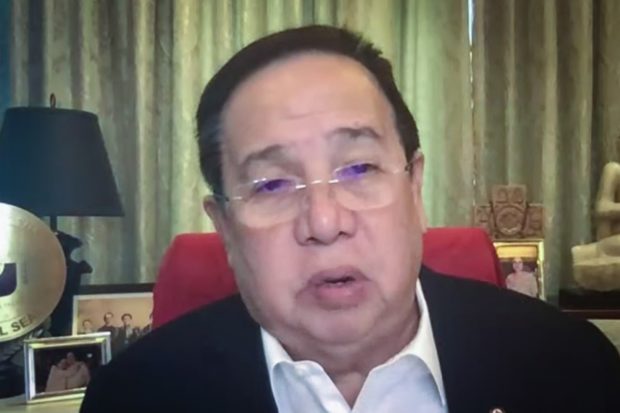Gordon urges gov’t to increase testing, tracing to curb COVID-19 surge
MANILA, Philippines — Senator Richard Gordon on Friday appealed for government to ramp up its contact tracing capabilities and raise daily COVID-19 tests to 90,000 in order to curb the surging coronavirus cases.
In a statement, Gordon said focusing on testing, tracing, and treating COVID-19 patients would ensure that the surge of COVID-19 cases in Metro Manila and adjacent provinces are kept in check.
Gordon, who is also chairperson of the Philippine Red Cross, said government should also shoulder the proposed 90,000 COVID-19 tests so as not to dissuade the public from taking the tests.
“Unang-una, dapat bayaran ng gobyerno ang test ng lahat ng tao dahil kapag ginawa nila ‘yan, maraming magpapa-test at masasawata natin ang kumakalat na pandemiya,” Gordon said in a television interview, transcripts of which were sent to media outfits.
(First of all, the government should shoulder the cost of tests of people because if they do that, a lot of people would have themselves tested and we can stop the spread of the pandemic.)
“Dapat ang tao, bigyan ng pagkakataong magkapagpa-test. Then you have to trace and finally, you have to treat,” he added.
(They should give people a chance to be tested. Then you have to trace and finally, you have to treat.)
Gordon also said that there may be a need to provide people with sufficient food packages to ensure that they would submit themselves to testing — as one of the primary factors why people shun COVID-19 tests is the lack of financial security.
This was the same observation made by Vice President Leni Robredo recently when her office saw a low response rate to their free COVID-19 testing through their Swab Cab initiative in Malabon. To solve the low turnout, they started giving food incentives to those who would undergo tests.
“Kinukuha natin ang mga asymptomatic spreader at nilalagay sila sa isolation center sa Ateneo. UP, La Salle, Adamson at marami pang mga eskwela ngayon para mahiwalay,” Gordon suggested.
(We should quarantine asymptomatic spreaders and place them in isolation centers, whether it’s Ateneo, UP, La Salle, Adamson, or any other schools so that those who will test positive could be isolated.)
“At habang nandun sila, tungkulin ng national government, local government, pati Red Cross na bigyan ng pagkain ‘yung mga maiiwan nila para hindi sila lalabas. Kaya maraming di nagpapa-test dahil ang takot nila, pag sila ay nagpositive, hindi na sila makakapagtrabaho,” he explained.
(And while they are there, it is the responsibility of the national government, the local government, and even the Red Cross to provide their relatives with food so that they would no longer move out. The reason why many do not want to be tested because they fear that once they test positive, they could no longer work.)
Metro Manila and other nearby provinces of Bulacan, Cavite, Laguna, and Rizal were placed under an enhanced community quarantine (ECQ) late March due to the sharp rise in COVID-19 cases.
While the ECQ status was downgraded to a modified ECQ, the number of cases has not gone down significantly.
Even if the country has recorded over 9,000 recoveries for the sixth straight day, active COVID-19 cases still remain over 100,000, and the bulk of which are found in the National Capital Region Plus bubble.
As of Friday, the country saw an additional 8,719 COVID-19 cases, bringing the active case count to 102,799.
But aside from these, Gordon said that enforcing minimum public health standards — and placing fines on violations — can curb the rise in cases.
“Dapat pag papasok sa trabaho o lalabas, naka-mask. Naghuhugas ng kamay, may baong sabon. Dapat hindi tayo nakikihalubilo sa lahat, dapat sasakay tayo sa mga bus na maluluwag, hindi tayo makikipagkumpulan at hindi tayo kakain ng sabay-sabay,” Gordon said.
(When they go to work, they should wear a mask. They should wash their hands, bring soap with them. We should not engage and join gatherings, we should ride buses that are spacious, we should not crowd in small spaces and refrain from eating altogether.)
“Ang problema natin, hindi natin sinusunod ‘yan. Dapat magbibigay ng libreng masks sa mga tao at pag may makitang hindi nagsususuot ng mask, dapat may fine. Pag ginawa mo ‘yan, marami tayong mababawas sa mga nagkakasakit. Ang importante, we have to protect ourselves, our families and our community,” he added.
(Our problem is, these are not followed strictly. We should give free masks for people and if enforcers see someone not wearing masks, there should be a fine. If you do that, we can reduce the number of people getting sick.)
